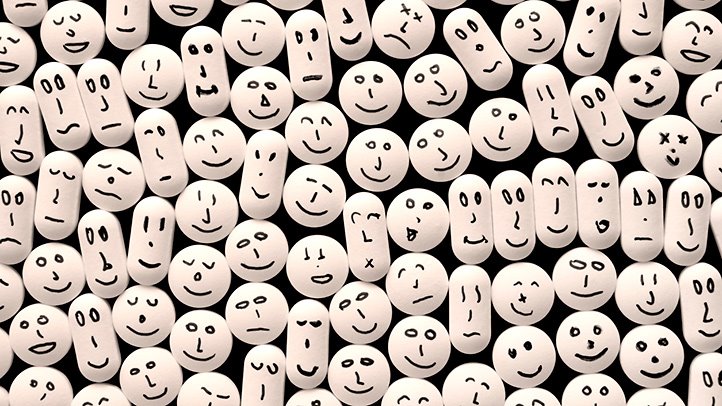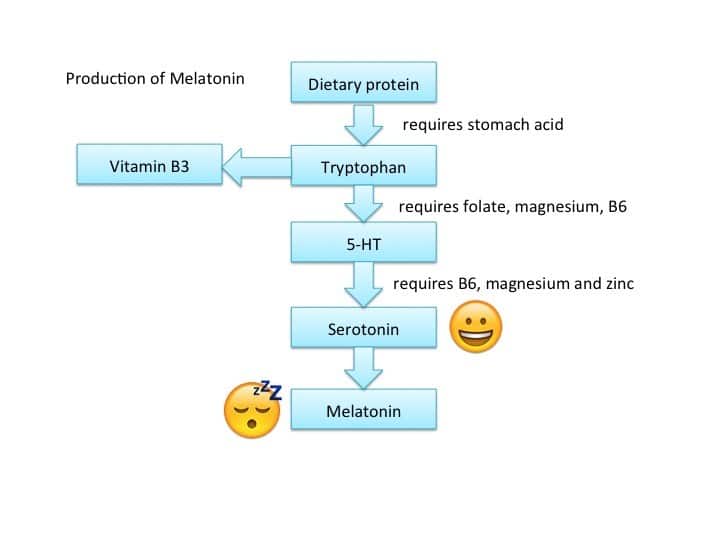Supplements that work against stress, anxiety and depression
If nutrition is not enough to combat stress, anxiety or depression, we can always use a number of supplements that can alleviate or remedy depression. Stress and anxiety are the same for the body and are often linked to depression.

How the supplements work against stress, anxiety and depression
In most cases, increasing serotonin can combat depression. Doctors often do this with medication (with side effects), while naturopaths and herbalists look at nutrition, herbs and supplements. The following supplements can help with different types of depression.
The production of serotonin
Below you can see how serotonin can be formed. All substances mentioned are therefore necessary and can be obtained from food or supplemented with supplements to be on the safe side.

Tryptophan
Tryptophan is the amino acid that is used as a building block for serotonin. Tryptophan is better absorbed if no other amino acids (building blocks of proteins) are present. You take tryptophan before going to sleep.
Magnesium
Magnesium citrate is the most absorbable form of magnesium. In addition to forming serotonin, magnesium is involved in thousands of other biochemical processes. You take the extra magnesium citrate before going to sleep.
Multivitamin
To meet all the B vitamins and zinc required for the process of producing serotonin, we recommend Animal pak. Animal pak is a high-dose multivitamin and contains many more vitamins and minerals that are beneficial to your health. Half a dose per day is enough. Animal pak can be purchased in powder form or pills. You can take the pills every other day. You can use half the dose of the powder per day. Athletes are advised to take a full dose before exercising.
Vitamin D
Vitamin D is actually already in Animal pak, but the intake could be a bit higher. Especially in winter. In summer, the body produces some vitamin D in the sun. If there is little summer sun, take extra vitamin D (100 micrograms before going to sleep).
DHA and EPA
DHA and EPA are omega 3 fatty acids that are commonly found in fish oil and Krill oil. DHA and EPA are involved in serotonin release and sensitivity. Take Omega 3 with DHA and EPA before going to sleep. Krill oil contains less DHA and EPA per gram, but in the form found in krill oil it can reach the brain better. In the case of combating depression, krill oil works better and the daily dose is 2 grams.
Read more about this here the importance of omega 3
SAMe
SAMe increases serotonin, dopamine and norephedrine. The dosage is 2x 500mg per day.
GABA
GABA is recommended to combat anxiety caused by depression. The daily dose is 250 mg.
5-HTP
5-HTP is the precursor of serotonin and can be taken if the conversion or absorption of tryptophan is not optimal or to increase serotonin through supplementation. The recommended dosage is 100mg 3 times a day.
Saffron
Saffron works against depression by inhibiting inflammation, reducing oxidative stress, regulating the stress response (hypothalamic-pituitary-adrenal axis), stimulating GABAergic (gamma-aminobutyric acid) neurotransmission and inhibiting reuptake of monoamine neurotransmitters (dopamine, norepinephrine, serotonin) in the brain. 50 mg of saffron extract per day is a high dose with a good effect against depression.
Rhodiola
Rhodiola improves mood by regulating the activity of monoamines such as serotonin, dopamine and norephedrine. Rhodiola improves serotonin levels in the hippocampus and repairs damage to neurons. The active substances rosavin and salidroside reduce depression by improving the transport of tryptophan and 5-HTP. The recommended dosage is between 500 and 750mg per day.
Phenylalanine & Tyrosine
Phenylalanine and tyrosine are amino acids that are probably not necessary as a supplement if sufficient protein is eaten. They do play a role in depression, but a protein preparation such as whey contains enough phenylalanine and tyrosine (read more about this here amino acids against depression).
N-acetyl cysteine (NAC)
N-acetyl cysteine does not occur in our diet, but the body makes it from L-cysteine. In some cases of depression, too little N-acetyl cysteine is made from L-cysteine and then supplementing with NAC is a solution.
The daily dose of N-acetyl cysteine (NAC) is 1000 mg and the therapeutic daily dose is approximately 2000 mg. It is best to take it on an empty stomach with water.
Be careful with medication. N-acetyl cysteine (NAC) can increase the effect of antidepressants, nitroglycerin and anticoagulants. Consult your doctor first if you are taking medication.
Acetyl-L-carnitine (ALCAR)
Acetyl-L-carnitine is particularly effective against depression and inflammatory diseases. Acetyl-L-carnitine (ALCAR) increases the synthesis of serotonin (low serotonin causes depression) and it ensures that the mitochondria, the energy factories in the cells, work better so that it prevents depression due to exhaustion.
The recommended dosage is 1 to 3 grams per day, preferably not in the evening on an empty stomach.
Be careful with medication. Acetyl-L-carnitine (ALCAR) can increase the effect of antidepressants, nitroglycerin and anticoagulants. Consult your doctor first if you are taking medication.
Creatine
Creatine ensures that cells can contain or recover more ATP, energy for the cells. As a result, cells that use a lot of energy, such as muscles and nerve cells in the brain, are less likely to be exhausted and there is less chance of complications such as depression due to oxidative damage and/or depletion of energy. The recommended dose of creatine is 5 grams of creatine monohydrate per day.
